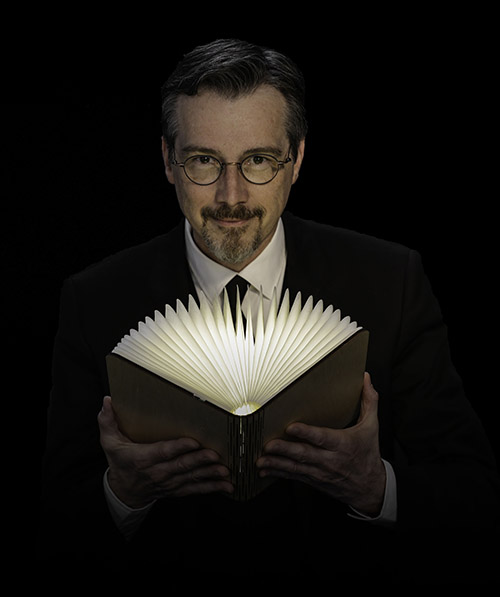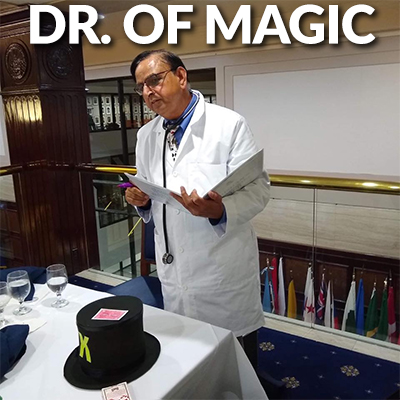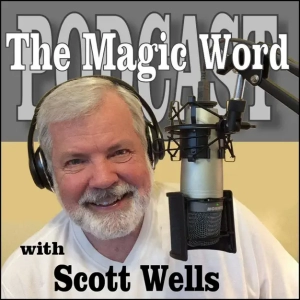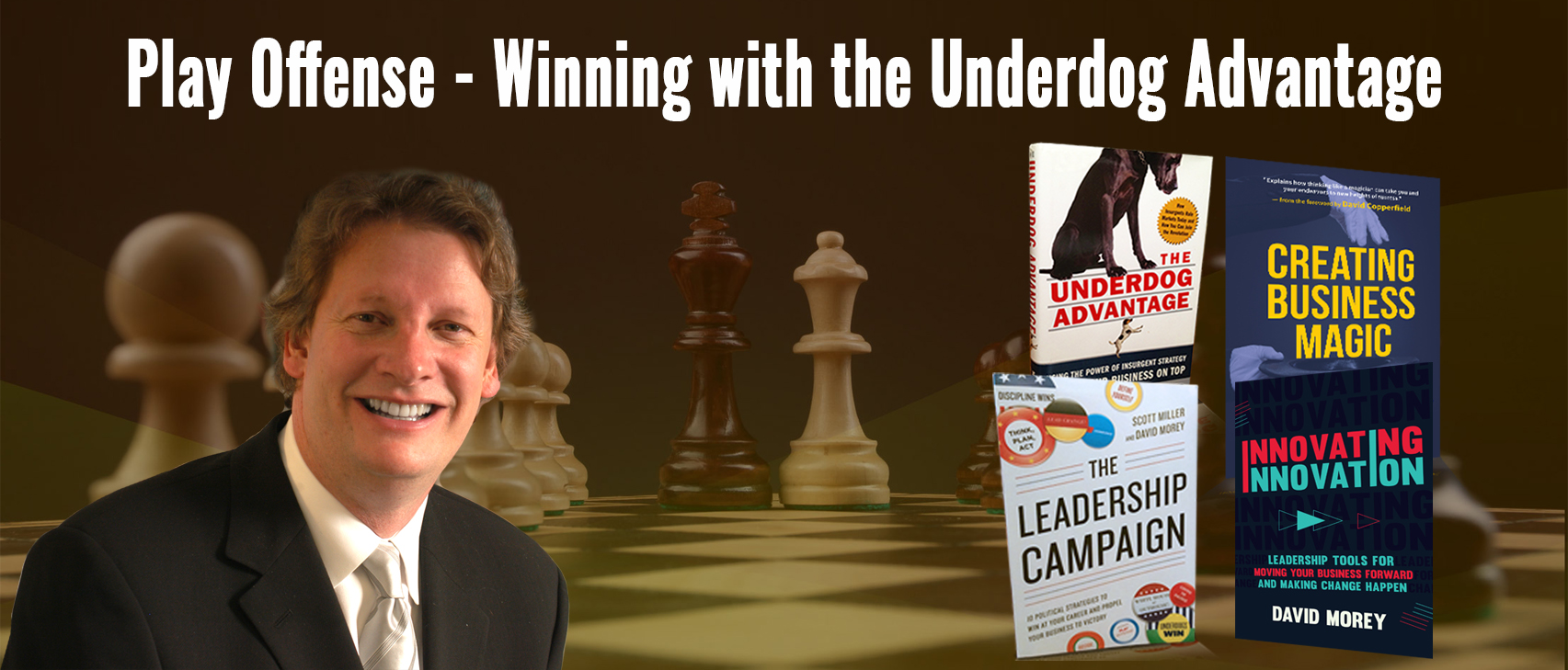SAIS Professor John McLaughlin makes ‘magic with meaning’
The former acting director of the CIA has performed for Cub Scouts, church groups, and senior government officials from all over the world (also, collaborated with David Copperfield)
Abigail Green / Published Dec 9
Ever since he saw the 1953 film as a child about the magician and escape artist Harry Houdini, John McLaughlin has been fascinated by magic. “It was spellbinding to me,” he says, recalling the Technicolor production starring Tony Curtis. McLaughlin ran straight to the library in his hometown of Pittsburgh and checked out an illustrated children’s guide to magic.
McLaughlin taught himself some simple card tricks and began performing magic at Cub Scout meetings and church groups. For the next 30-plus years, he honed his craft as a magician while he served in the U.S. Army, pursued his education, and climbed the ranks of his career.
In 1966, McLaughlin graduated from the Johns Hopkins School of Advanced International Studies with a master’s in international relations. After a tour in Vietnam and another stint of graduate work at the University of Pennsylvania, he embarked on a three-decade career in the Central Intelligence Agency, serving in the early 2000s as the agency’s deputy director and acting director. McLaughlin is still asked occasionally to advise in the intelligence field. He is currently a professor of practice in the Merrill Center for Strategic Studies at SAIS, where he teaches the course American Intelligence: Its Role, Practice, and Impact.
Open window with background of clouds and sky
My Other Life
What we do when we’re not on campus
Throughout his illustrious career, McLaughlin has continued to study and perform magic. During the pandemic, he put together an online program with David Copperfield and every year performs at the Aspen Security Forum for senior government officials from all over the world. “In one show, I had a card chosen by the British foreign minister and a card chosen by the French national security adviser, and the former foreign minister of Israel came up and helped me with a rope trick,” he says.
In October, McLaughlin traveled to Las Vegas as part of a small group of students specially selected for a study session by one of the top magicians in the world, Jeff McBride, who is a consultant for just about every major professional magician currently performing in Vegas. It was more of a theoretical class than about learning new tricks, he says.
McLaughlin clarifies that he and his fellow professional magicians do not actually like to call what they do magic tricks. “We call them effects or mysteries,” he says. “It’s not a puzzle or a trick. You’re not trying to get one over on the audience. It’s really that you’re involving them in a narrative, and the magic is being used to illustrate the concepts that you’re talking about.”
As McLaughlin demonstrates a quick example using $1 bills, it’s clear that he is a master of presentation and storytelling as well as his scholarly pursuits. He rattles off historical events, dates, the names of ancient texts, artworks, and magicians, all while weaving a tale of how a simple stack of $1 bills can turn into $20s and then back again—and they do, right before our eyes.
McLaughlin calls the school of magic he practices “magic with meaning.” He has been known to use it in his classes at SAIS to make a point and foster discussion among his students. For instance, he might take a piece of rope, make a sliding knot, and show how the rope turns red as the knot moves from one end to the other.
“In trying to understand the world, and particularly from an intelligence perspective, information arrives incrementally. You never have all the information you want, but you still have to make a judgment,” he says. “And the point I’m trying to illustrate with this simple little rope trick is, be careful to make clear what you know and what you don’t know and what you think. As information arrives, your picture of this situation may change pretty radically because, as you can see, this is a very different rope than we started with.”
“We’re in the middle of the greatest technological revolution in history. So, what’s the role of magic in that? It’s to remind people that we don’t know everything. There is still an element of mystery to life.”
John McLaughlin
Professor at SAIS
McLaughlin is one of the founding members of Washington Magic, an ensemble show performed in a 215-year-old townhouse in D.C., the former home of President James Monroe and current home of the Arts Club of Washington. The elegant performance hearkens back to the full-evening magic shows of his youth that often included live orchestras, troupes of assistants, and tuxedoed magicians, McLaughlin says. At Washington Magic, the 90-minute show features four or five performers, each of whom does about a 15-minute set on stage in the intimate 70-seat theater. Tickets include drinks and heavy hors d’oeuvres.
Unfortunately, McLaughlin says, he had to miss a recent show because of a professional engagement: A Stanford University professor had invited him to participate in a simulation for her class in which teams of students would react to a crisis scenario and propose solutions to the National Security Council, which would assess their responses and provide feedback based on the members’ experience. “I played the secretary of state,” McLaughlin says.
While magic is an ancient art, he says he believes it is particularly relevant to this moment in history, when cellphones, AI, and other advancements give us the illusion of complete knowledge. “We’re in the middle of the greatest technological revolution in history. So, what’s the role of magic in that?” McLaughlin asks. “It’s to remind people that we don’t know everything. There is still an element of mystery to life.”
Washington Magic hosts a show every four to six weeks or so. Check the website for upcoming dates and tickets to see McLaughlin perform.
My Other Life is a recently launched At Work series that lets us get to know our Johns Hopkins colleagues better. Do you or one of your co-workers have a personal passion that would make a good story? Let us know at hubatwork@jhu.edu.

 From Larry Hass:
From Larry Hass: What’s the first magical thing you remember seeing? And who is the first magician you ever saw?
What’s the first magical thing you remember seeing? And who is the first magician you ever saw? It was a hot and muggy night in Warsaw, unusual for this time of the year. Sitting at the bar was a man nursing a beer. No one noticed his unkempt appearance or the bulge in his jacket pocket. As the bartender rang up another transaction, a young man wearing a ball cap swung open the door. A quick sideways glance was given to the stranger who strode over to take a seat at the bar. The young man ordered a beer then turned and quietly said, “Erdnase.” After a few uneasy moments that seemed like an eternity, the man reached into his pocket. He pulled out a deck of cards and suddenly…it was magic time. That could have gone in a completely different direction and oftentimes it does in the world of spy craft. This week we chat with the former Acting Director of the Central Intelligence Agency (C.I.A.), John McLaughlin. There is an overlap and kinship in the keeping of secrets both as spies and as magicians, though one doesn’t control the balance of life and death in their hands. John is an American Intelligence Officer who served as Deputy Director of the C.I.A. under President Bill Clinton and then briefly as the Acting Director of the C.I.A. under President G.W. Bush then retired in 2004. McLaughlin currently serves as a Senior Fellow and Distinguished Practitioner-in-Residence at the Philip Merrill Center for Strategic Studies at the Johns Hopkins University Paul H. Nitze School of Advanced International Studies (SAIS) in Washington, D.C View fullsize View fullsize View fullsize View fullsize View fullsize View fullsize View fullsize
It was a hot and muggy night in Warsaw, unusual for this time of the year. Sitting at the bar was a man nursing a beer. No one noticed his unkempt appearance or the bulge in his jacket pocket. As the bartender rang up another transaction, a young man wearing a ball cap swung open the door. A quick sideways glance was given to the stranger who strode over to take a seat at the bar. The young man ordered a beer then turned and quietly said, “Erdnase.” After a few uneasy moments that seemed like an eternity, the man reached into his pocket. He pulled out a deck of cards and suddenly…it was magic time. That could have gone in a completely different direction and oftentimes it does in the world of spy craft. This week we chat with the former Acting Director of the Central Intelligence Agency (C.I.A.), John McLaughlin. There is an overlap and kinship in the keeping of secrets both as spies and as magicians, though one doesn’t control the balance of life and death in their hands. John is an American Intelligence Officer who served as Deputy Director of the C.I.A. under President Bill Clinton and then briefly as the Acting Director of the C.I.A. under President G.W. Bush then retired in 2004. McLaughlin currently serves as a Senior Fellow and Distinguished Practitioner-in-Residence at the Philip Merrill Center for Strategic Studies at the Johns Hopkins University Paul H. Nitze School of Advanced International Studies (SAIS) in Washington, D.C View fullsize View fullsize View fullsize View fullsize View fullsize View fullsize View fullsize

